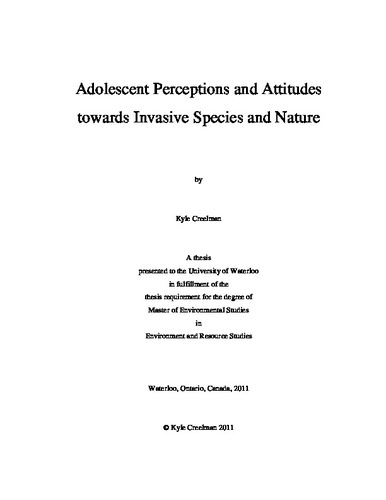| dc.contributor.author | Creelman, Kyle | |
| dc.date.accessioned | 2011-09-30 14:11:07 (GMT) | |
| dc.date.available | 2011-09-30 14:11:07 (GMT) | |
| dc.date.issued | 2011-09-30T14:11:07Z | |
| dc.date.submitted | 2011-09-26 | |
| dc.identifier.uri | http://hdl.handle.net/10012/6307 | |
| dc.description.abstract | Invasive species are one of many important environmental issues facing Canadians today. A great deal of research has explored both the scientific and social aspects of invasive species. However, the cumulative research has not yet thoroughly explored people’s thoughts and feelings about, or perceptions of, invasive species and the influence these may have on management of, or policy decisions regarding, invasive species.
This thesis research project was designed to assess the attitudes and perceptions that high school students have towards invasive species and to determine to what extent learning about invasive species alters their connection with nature. The study group was comprised of students from four Grade 11 Environmental Science classes from three high schools within the city of Guelph, Ontario. The students received regular classroom instruction from their teachers covering the course content, including invasive species. Students also made weekly visits to a local nature centre, providing them with hands-on learning experiences related to the course content.
Students responded to an 80-question survey that assessed their knowledge of local invasive species and attitudes towards them as well as students’ connection to nature. Their connection to nature was assessed using a modified version of the Connectedness to Nature Scale (Mayer & Frantz, 2004). The surveys were administered by the classroom teachers in October, 2010, prior to the presentation of instructional material covering invasive species and then again in December, 2010 when the presentation of instructional material concerning invasive species was complete. The results showed that the students’ knowledge of invasive species upon entering the course was quite low and each of the classes witnessed a significant increase in knowledge. The survey results did not reveal any change to the students’ connection to nature; however, they did reveal three underlying themes in students’ attitudes towards invasive species: a concern about invasive species as a threat or problem; feelings of acceptance towards invasive species; and feelings of anxiety about invasive species. These attitudes remained relatively unchanged after the course. | en |
| dc.language.iso | en | en |
| dc.publisher | University of Waterloo | en |
| dc.subject | Invasive Species | en |
| dc.subject | Environmental Education | en |
| dc.subject | Connection to Nature | en |
| dc.title | Adolescent Perceptions and Attitudes towards Invasive Species and Nature | en |
| dc.type | Master Thesis | en |
| dc.pending | false | en |
| dc.subject.program | Environmental and Resource Studies | en |
| uws-etd.degree.department | Environment and Resource Studies | en |
| uws-etd.degree | Master of Environmental Studies | en |
| uws.typeOfResource | Text | en |
| uws.peerReviewStatus | Unreviewed | en |
| uws.scholarLevel | Graduate | en |

